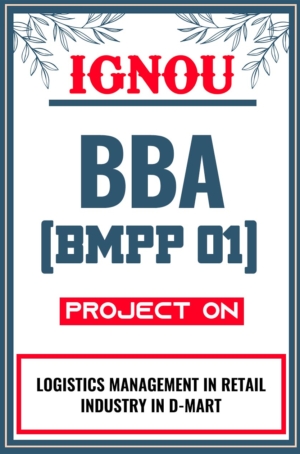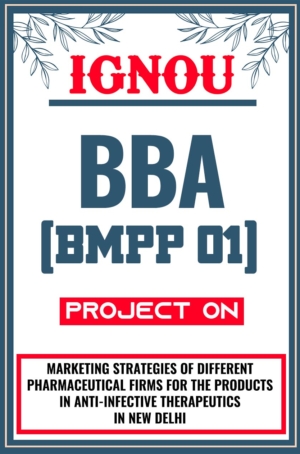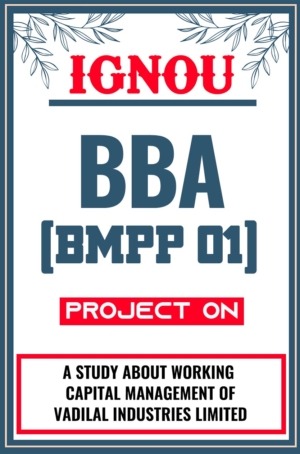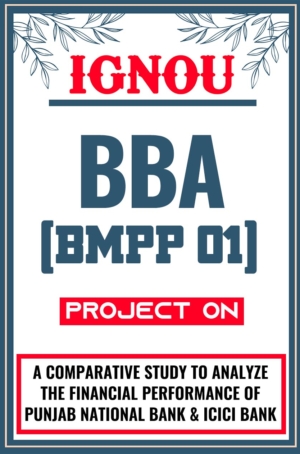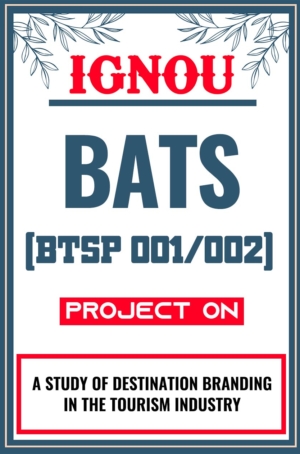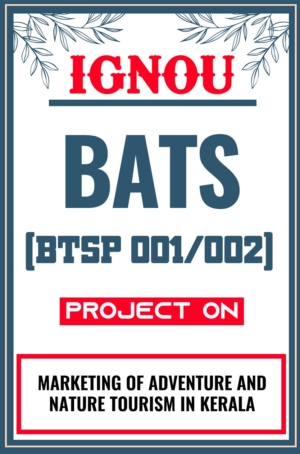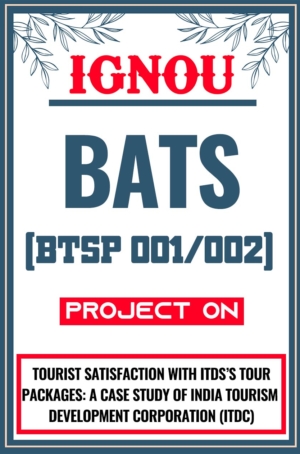Buy Latest IGNOU Project Report and IGNOU Synopsis
IGNOU offers a wide range of undergraduate and postgraduate programs, many of which require students to complete an IGNOU project or an IGNOU synopsis. An IGNOU Synopsis is a brief summary of your IGNOU project that you intend to make. It is essentially a description of what you propose to do and how you intend to go about it. Usually, it should be 1000 words in length (approx. 10-14 pages). It should be developed and approved in consultation with the project supervisor. The purpose of the IGNOU project is to provide students with practical experience and to apply theoretical knowledge to real-world situations. It also helps in developing research, analytical, and problem-solving skills.
Need help with an IGNOU Project Report or IGNOU Synopsis? This is no longer an issue. Our project synopsis writing services include IGNOU Project Report and IGNOU Synopsis. We are available 24/7 to all IGNOU students worldwide.
Whatsapp us to get the Personalized (Customized) or Readymade IGNOU Project Report or IGNOU Synopsis
WhatsApp Us
Get Your Personalized IGNOU Synopsis & IGNOU Project as per IGNOU’s Guideline. 10000+ Synopsis Approved. We offer Plagiarism Free IGNOU Project Synopsis Report. Get A+ Grades in IGNOU Project.
Our pedagogy encompasses IGNOU Synopsis/Reports for Bachelor’s and Master’s Degrees. We have around 30 + professional writers on staff to help students produce and coach them as they embark on their IGNOU journeys. Our academics are always producing new IGNOU Projects and revising existing IGNOU Project Reports in response to comments.
Check Availability And Get Started
We also Provided Readymade IGNOU Project Report or IGNOU Synopsis. Check the Availability of your IGNOU Projects for your course by searching the subject code of your Programme.
Note: These are ready-made sample IGNOU Project Synopsis Reports for students to learn how to write a synopsis and project report. Many students can consider buying them. Since IGNOU does not accept repeated projects, if you want a unique project that has not been submitted by any other student with an approval guarantee, Whatsapp us at 9958947060 and you can send your project topic also.
|
MBA |
MAPC | BTS |
| MADE | MSCCFT |
PGDPPED |
|
DNHE |
MPA | AMT |
| PGDRD | PGDEMA |
MEC |
|
DECE |
DPLAD | MSW |
| PGCPP | MAAE |
MSC(MACS) |
|
CCP |
CPSCM | CES |
| DAQ | PGDDC |
PGDIDM |
|
PGDBP |
PGDCSR | PGDLAN |
| MSCENV | MGPS |
MAAN |
|
CAHT |
PGDWGS | PGDSS |
| PGDET | MAWGS |
MADVS |
|
MASS |
MACSR | MAUS |
| MARDOL | PGDRDOL |
BTSOL |
|
BAFSM |
BAVMSME | PGDECFE |
| MCOMOL | PGDIDMOL |
PGDDCOL |
|
PGDEOHOL |
MBAOL | MBAOL |
| DTSOL | MAGPSOL |
MAEC |
|
MAJDM |
MAJEM | MADJ |
| PGDSSOL | MAEDU |
MTTM |
|
MED |
MED | AHE |
| MPS | MSCDFSM |
PGDHE |
|
PGDFSQM |
PGDCJ | MLIS |
| PGCINDS | DSCDM |
PGDHHM |
|
BSCANH |
BAVTM | PGDEOH |
| MCOM | MAEOH |
PGDAB |
|
PGCIPWS |
PGDINDS | PGDEME |
| DNHEOL | MAJMCOL |
MBAOL |
|
MAMIDI |
MAWGSR | PGDAIC |
| DTS | MARD |
PGDDM |
|
PGDIS |
DIPP | CSWATT |
| PGCIPWS | MAER |
MAJMC |
|
BAPFHMH |
PGDFCS | BAPCH |
| MSCRWEE | MSCFSQM |
CETM |
|
MADEOL |
MBAOL | MAEVS |
| MADP | CHCWM |
CIHL |
|
MSCIS |
MAGD | MAFCS |
| PGDUPDL | PGDMIDI |
MASSOL |
|
CPSCMOL |
DWM |
How do you write an IGNOU Project Synopsis?
Writing a synopsis for your project involves creating a concise and clear outline of your proposed research. Here’s a step-by-step guide to help you craft a compelling synopsis:
Step-by-Step Guide to Writing a Synopsis
Title of the Project:
-
- Choose a clear, concise, and descriptive title for your project.
-
- Ensure it reflects the main theme or objective of your research.
Introduction:
-
- Provide background information about the topic.
-
- Explain the significance and relevance of the research.
-
- State the problem or issue you aim to address.
Objectives:
-
- List the main goals of your research.
-
- Ensure objectives are specific, measurable, achievable, relevant, and time-bound (SMART).
Literature Review:
-
- Summarize existing research related to your topic.
-
- Highlight gaps in the current knowledge that your project will address.
-
- Provide a rationale for your study based on the literature review.
Research Methodology:
-
- Describe the research design (qualitative, quantitative, or mixed methods).
-
- Detail the data collection methods (surveys, interviews, experiments, etc.).
-
- Explain the sampling methods and sample size.
-
- Outline the data analysis techniques you will use.
-
- Mention any tools or software you will use for analysis.
Expected Outcomes:
-
- State the anticipated results or findings of your research.
-
- Explain the potential impact and implications of your findings.
References:
-
- Provide a preliminary list of references and sources you will use.
-
- Follow the citation style specified by IGNOU (usually APA or MLA).
Timeline:
-
- Create a timeline for your project, outlining major milestones and deadlines.
-
- Include stages such as literature review, data collection, data analysis, and report writing.
When should you start working on your IGNOU project?
Starting your project at the right time is crucial for ensuring a smooth and successful completion. Here are some guidelines to help you decide when to start working on your project:
When to Start Working on Your IGNOU Project
-
- Understand the Course Requirements: Familiarize yourself with the project requirements outlined in your course syllabus or program guide. Note any specific deadlines for the synopsis submission, project submission, and viva-voce.
-
- Early Planning: Begin thinking about potential project topics early in your course, ideally at least 6-8 months before the final submission deadline. Conduct preliminary research to explore various topics and identify areas of interest.
-
- Consult Your Supervisor: Reach out to your assigned supervisor as soon as possible to discuss potential project ideas. Seek guidance on choosing a feasible and relevant topic.
-
- Submit Your Synopsis: Prepare and submit your project synopsis for approval. This should ideally be done 5-6 months before the project submission deadline. Allow time for any revisions and feedback from your supervisor.
-
- Start the Project Work: Once your synopsis is approved, begin your project work immediately. This should be around 4-5 months before the final submission deadline.
-
- Create a Timeline: Develop a detailed timeline for your project, breaking it down into manageable stages such as literature review, data collection, data analysis, and report writing. Allocate specific time periods for each stage and stick to your schedule.
-
- Regular Progress Checks: Schedule regular check-ins with your supervisor to discuss your progress and address any challenges. Use these meetings to receive feedback and make necessary adjustments to your project plan.
-
- Allow for Contingencies: Plan for unexpected delays by building some buffer time into your schedule. Aim to complete your project a few weeks before the submission deadline to allow time for final revisions and proofreading.
What is the role of the supervisor?
The supervisor plays a crucial role in guiding you throughout your IGNOU project. Here’s a breakdown of their responsibilities:
Guidance and Support:
-
- Topic Selection: They can help you refine your research topic, ensuring it’s relevant, focused, and feasible within the project scope.
-
- Methodology: The supervisor can advise you on appropriate research methods for data collection and analysis, considering your chosen topic.
-
- Literature Review: They can guide you in finding relevant academic sources and conducting a thorough literature review.
-
- Project Structure: They can help you structure your project report logically, ensuring it follows IGNOU’s formatting guidelines.
-
- Progress Monitoring: The supervisor can offer feedback on your progress throughout the project, helping you stay on track and address any challenges.
Approval and Evaluation:
-
- Synopsis Approval: Your supervisor reviews and approves your project synopsis before you proceed with the full research.
-
- Project Report Review: They may provide feedback on your final project report, ensuring it meets the university’s standards for content and presentation.
Do you need to get your IGNOU Project synopsis approved?
Yes, getting your synopsis approved is absolutely necessary before you proceed with your IGNOU project. It acts as a crucial first step that ensures your research aligns with the program’s expectations and is feasible within the project scope.
Here’s why getting approval is important:
-
- Direction and Planning: The synopsis approval process helps you solidify your research plan. Your supervisor can review your proposed methodology, data collection methods, and ensure they are appropriate for your topic.
-
- Alignment with Program: Approval ensures your project aligns with the learning objectives of your program. Your supervisor can help you refine your topic to make sure it’s relevant and contributes to your academic development.
-
- Feasibility Check: The process helps identify any potential challenges or limitations in your project design. Your supervisor can guide you towards a more achievable and focused research plan.
-
- Time Management: Getting approval early saves you time and effort in the long run. By addressing any concerns upfront, you can avoid having to rework significant portions of your project later.
What if you fail your IGNOU project?
Failing your IGNOU project can be disappointing, but it’s important to understand that there are steps you can take to address the situation and successfully complete your project. Here’s what you can do if you fail your IGNOU project:
Steps to Take if You Fail Your IGNOU Project
Understand the Reasons for Failure:
-
- Review the Feedback: Carefully review the feedback and comments provided by the evaluator. Understanding the specific reasons for failure is crucial for making necessary improvements.
-
- Identify Weaknesses: Identify the areas where your project fell short, whether it’s the research methodology, data analysis, literature review, or overall presentation.
Consult Your Supervisor:
-
- Discuss Feedback: Arrange a meeting with your supervisor to discuss the feedback in detail. They can provide additional insights and clarify any points of confusion.
-
- Seek Guidance: Seek your supervisor’s guidance on how to address the weaknesses and improve your project. They can help you create a plan for revision.
Plan for Revisions:
-
- Create a Revision Plan: Based on the feedback and discussions with your supervisor, create a detailed plan for revising your project. Prioritize the most critical areas first.
-
- Set a Timeline: Establish a realistic timeline for completing the revisions. Ensure you allocate enough time for each stage of the revision process.
Make Necessary Improvements:
-
- Revise Content: Make substantial improvements to the content, ensuring you address all the points highlighted in the feedback.
-
- Strengthen Research: If the research methodology or data analysis was a weak point, consider collecting additional data or reanalyzing existing data using more appropriate methods.
-
- Enhance Clarity and Presentation: Improve the clarity, coherence, and overall presentation of your project. Ensure that your arguments are logically structured and well-supported by evidence.
Proofread and Format:
-
- Proofread Thoroughly: Carefully proofread your revised project to eliminate any grammatical, typographical, or formatting errors.
-
- Adhere to Guidelines: Ensure that your project adheres to IGNOU’s formatting and submission guidelines.
Resubmit Your Project:
-
- Submit on Time: Submit the revised project by the deadline specified by IGNOU. Ensure all required documents and forms are included with your submission.
-
- Retain Copies: Keep copies of all documents and your revised project report for your records.
Can you use online resources for your IGNOU project research?
Yes, you can and should use online resources for your IGNOU project research. Here’s how you can effectively utilize online resources while ensuring academic integrity:
Identifying Reliable Sources:
-
- Academic Databases: Use reputable academic databases such as JSTOR, PubMed, IEEE Xplore, or Google Scholar to find scholarly articles, research papers, and conference proceedings relevant to your topic.
-
- University Libraries: Many universities provide online access to extensive digital libraries that include journals, books, and other academic resources.
-
- Official Websites: Government websites, international organizations, and professional associations often publish reports, statistics, and research findings that can support your project.
Searching Strategies:
-
- Keywords: Use specific keywords and phrases related to your research topic to refine your search results and find relevant literature.
-
- Filters: Utilize filters on search engines and databases to narrow down results based on publication date, study type, or geographical location.
Evaluating Sources:
-
- Peer-reviewed Articles: Prioritize peer-reviewed articles and journals, as they undergo rigorous evaluation by experts in the field.
-
- Credibility: Evaluate the credibility of sources by checking the author’s credentials, publication venue, and whether the information is supported by reputable institutions or organizations.
-
- Currency: Ensure the information is up-to-date and reflects current research and developments in your field.
Avoiding Plagiarism:
-
- Cite Properly: Always cite sources correctly using the citation style specified by IGNOU (e.g., APA, MLA). Provide proper attribution whenever you use ideas, data, or direct quotes from online sources.
-
- Paraphrase and Synthesize: Avoid copying and pasting text verbatim from online sources. Instead, paraphrase information in your own words and synthesize ideas from multiple sources to create a cohesive argument.
Ethical Considerations:
-
- Copyright Compliance: Respect copyright laws and permissions when using online materials. Seek permission or use materials under fair use guidelines as appropriate.
-
- Data Privacy: Be mindful of data privacy and confidentiality issues, especially when using data obtained from online sources.
What tools can you use for data analysis in your IGNOU project?
There are several tools and software options you can use for data analysis in your IGNOU project, depending on the nature of your research and the type of data you have collected. Here are some commonly used tools:
Statistical Software:
-
- SPSS (Statistical Package for the Social Sciences): Widely used for statistical analysis in social sciences and business research. It offers a range of analytical capabilities for descriptive statistics, correlations, regression analysis, and more.
-
- R: A powerful and free software environment for statistical computing and graphics. R is highly customizable and supports a wide range of statistical techniques, making it popular among researchers in various fields.
-
- Stata: Another comprehensive statistical software package commonly used in academic research, especially in economics, sociology, political science, and epidemiology.
-
- SAS (Statistical Analysis System): Provides advanced analytics, multivariate analysis, data management, and predictive modeling capabilities. It is widely used in healthcare, financial services, and market research.
Data Visualization Tools:
-
- Tableau: A popular tool for creating interactive and shareable dashboards, graphs, and visualizations from data. It helps in presenting complex data in a visually appealing and understandable manner.
-
- Microsoft Excel: While primarily a spreadsheet application, Excel includes built-in tools for data analysis and visualization, such as pivot tables, charts, and statistical functions. It is useful for basic data analysis tasks.
-
- Python with Libraries (e.g., Pandas, Matplotlib, Seaborn): Python is a versatile programming language that, when used with libraries like Pandas for data manipulation and Matplotlib/Seaborn for visualization, offers flexibility and customization in data analysis and presentation.
Qualitative Data Analysis Tools:
-
- NVivo: A qualitative data analysis (QDA) software that helps researchers organize, code, and analyze unstructured text, audio, video, and image data.
-
- Atlas.ti: QDA software for qualitative analysis of textual, graphical, audio, and video data. It supports systematic coding and deep insights into qualitative research data.
Geospatial Analysis Tools:
-
- ArcGIS: A geographic information system (GIS) for working with maps and geographic data. It is used for spatial analysis, mapping, and visualization of spatial patterns and relationships.
How specific should the objectives in your IGNOU Project synopsis be?
The objectives in your IGNOU project synopsis should be quite specific. They should be clear, concise, and measurable statements that outline the exact outcomes you aim to achieve through your research.
Here’s why specific objectives are important:
-
- Clarity and Focus: Specific objectives ensure your research has a clear direction and helps you stay focused on what you’re trying to achieve.
-
- Feasibility: By setting specific objectives, you can assess whether they are achievable within the project timeframe and resource constraints.
-
- Evaluation: Specific objectives make it easier to evaluate the success of your research project by allowing you to measure the extent to which you achieved your stated goals.
Here are some tips for writing specific objectives for your IGNOU Project synopsis:
-
- Use action verbs: Start your objectives with action verbs like “to analyze,” “to compare,” “to evaluate,” or “to investigate.”
-
- Quantify whenever possible: If possible, quantify your objectives with specific numbers or measurable terms.
-
- Focus on outcomes: Your objectives should focus on the specific outcomes you want to achieve, not just the activities you will undertake.
-
- Limit the number: While you can have multiple objectives, aim for 3-5 clear and concise statements to avoid overwhelming the reader.
Here’s an example of a general vs. specific objective:
-
- General Objective: To study the impact of social media on mental health.
-
- Specific Objective: To analyze the correlation between daily social media usage and symptoms of anxiety in adolescents aged 16-18.
Is it necessary to have a hypothesis in my IGNOU synopsis?
Including a hypothesis in your IGNOU project synopsis is not always mandatory, but it can be highly beneficial depending on your research approach. Here’s a breakdown of the pros and cons to help you decide:
Scenarios Where a Hypothesis is Beneficial:
-
- Quantitative Research: If your project involves quantitative research methods like surveys or experiments, formulating a hypothesis is crucial. A hypothesis allows you to establish a predicted relationship between variables and guides your data collection and analysis.
-
- Explanatory Research: When your research aims to explain a phenomenon or relationship, a hypothesis helps you clarify your predicted outcome and sets the stage for testing it.
How a Hypothesis Strengthens Your Synopsis:
-
- Clarity and Direction: A hypothesis demonstrates a clear understanding of your research topic and the relationship between variables you intend to study.
-
- Focus and Specificity: It helps you refine your research focus by providing a specific prediction you aim to test.
-
- Theoretical Framework: Formulating a hypothesis can strengthen your connection to existing theories and research in your field.
However, there are situations where a hypothesis might not be necessary:
-
- Exploratory Research: If your project is exploratory, aiming to gain a deeper understanding of a phenomenon rather than testing a specific prediction, a hypothesis might not be applicable.
-
- Qualitative Research: Qualitative research methods like interviews or focus groups often involve open-ended exploration rather than testing pre-determined hypotheses.
Here are some additional points to consider:
-
- Consult Your Supervisor: Discuss your research approach with your IGNOU supervisor. They can advise you on whether a hypothesis is necessary for your specific project.
-
- Alternative – Research Questions: For exploratory or qualitative research, you can frame clear research questions in your IGNOU project or synopsis instead of a hypothesis. These questions should guide your data collection and analysis.
Check Out: IGNOU Solved Assignment!
Ready to get your Latest IGNOU Project Report and IGNOU Synopsis?
- Call us or WhatsApp us at: 9958947060, 9354637830
- Visit: SHRICHAKRADHAR.COM
-
-
IGNOU BBA Project (BMPP 01) Synopsis/Proposal & Project Report/Dissertation in Soft-Copy (Sample-4)
₹499.00Original price was: ₹499.00.₹149.00Current price is: ₹149.00. -
IGNOU BBA Project (BMPP 01) Synopsis/Proposal & Project Report/Dissertation in Soft-Copy (Sample-3)
₹499.00Original price was: ₹499.00.₹149.00Current price is: ₹149.00. -
IGNOU BBA Project (BMPP 01) Synopsis/Proposal & Project Report/Dissertation in Soft-Copy (Sample-2)
₹499.00Original price was: ₹499.00.₹149.00Current price is: ₹149.00. -
IGNOU BBA Project (BMPP 01) Synopsis/Proposal & Project Report/Dissertation in Soft-Copy (Sample-1)
₹499.00Original price was: ₹499.00.₹149.00Current price is: ₹149.00. -
IGNOU BATS Project (BTSP 001/002) Synopsis/Proposal & Project Report/Dissertation in Soft-Copy (Sample-8)
₹499.00Original price was: ₹499.00.₹149.00Current price is: ₹149.00. -
IGNOU BATS Project (BTSP 001/002) Synopsis/Proposal & Project Report/Dissertation in Soft-Copy (Sample-7)
₹499.00Original price was: ₹499.00.₹149.00Current price is: ₹149.00. -
IGNOU BATS Project (BTSP 001/002) Synopsis/Proposal & Project Report/Dissertation in Soft-Copy (Sample-6)
₹499.00Original price was: ₹499.00.₹149.00Current price is: ₹149.00. -
IGNOU BATS Project (BTSP 001/002) Synopsis/Proposal & Project Report/Dissertation in Soft-Copy (Sample-5)
₹499.00Original price was: ₹499.00.₹149.00Current price is: ₹149.00.

